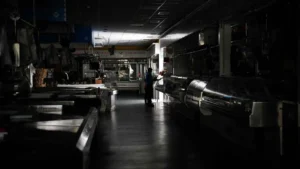It started with a joke—but behind the laughter exchanged between U.S. President Donald Trump and El Salvador’s President Nayib Bukele lies a chilling vision of power, surveillance, and mass incarceration.
“Sometimes they say we imprisoned thousands,” Bukele quipped during a recent White House meeting. “I like to say we actually liberated millions.”
“Who gave him that line?” Trump asked, grinning. “Do you think I can use that?”
The moment made headlines for its levity. But to observers familiar with El Salvador’s repressive past and the United States’ growing authoritarian undercurrents, the conversation was anything but amusing.
El Salvador President Bukele: “Sometimes they say that we imprisoned thousands, I like to say that we actually liberated millions.”
President Trump: “Who gave him that line, do you think I can use that?”
pic.twitter.com/k5waNSH1SF— Benny Johnson (@bennyjohnson) April 14, 2025
Beyond the Banter: Authoritarian Echoes
Bukele’s line, polished and performative, wasn’t just wordplay. It was a thesis—one that casts mass imprisonment as a means to collective “freedom.” It’s the kind of logic that reduces civil liberties to a tradeoff, suggesting safety and prosperity are worth the price of justice and human rights.
In reality, El Salvador now holds nearly 2 percent of its population behind bars, one of the highest incarceration rates in the world. The so-called liberation has come at an enormous human cost, with reports of mass detentions, due process violations, and alleged torture within Bukele’s sprawling carceral system, most infamously the Terrorism Confinement Centre (CECOT).
And the United States? It’s watching—and possibly emulating.
A Test Lab for Global Repression?
The meeting between Trump and Bukele was pitched as a cooperative front against “terrorist organizations” and a pledge to build “a future of prosperity.” But the subtext was unmistakable: this is about control, not just over criminal groups but over dissent, immigration, and the narrative itself.
“To liberate 350 million,” Bukele continued, “you have to imprison some.”
That “some” increasingly includes migrants, legal residents, and innocents caught in the crosshairs of flawed systems. One such case is Kilmar Abrego Garcia, a legal U.S. resident mistakenly deported to El Salvador and now held in CECOT. Bukele, when asked about his case, showed no interest in returning him to the U.S., despite mounting legal and diplomatic pressure.
Exporting Injustice
In a Truth Social post, Trump lauded Bukele’s willingness to “accept into his Nation’s custody some of the most violent alien enemies of the World.” But critics point out this rhetoric is more than bluster. It reflects a deepening partnership in authoritarian strategy—one where the U.S. may begin outsourcing its prison system, as Bukele himself suggested in a past tweet.
The implications are profound: if El Salvador once served as a testing ground for Cold War-era U.S. intervention, it may now be laying the blueprint for the digital-age surveillance state, complete with AI-driven policing, media spin, and tech-enabled repression.
Lessons from the Resistance
Yet, for every dystopian move, there’s also a flicker of resistance. Salvadoran civil society has pushed back before—against U.S.-backed death squads, military dictatorships, and state terror. The same tenacity may now offer global lessons in how to challenge today’s technofascism, both in Central America and beyond.






















